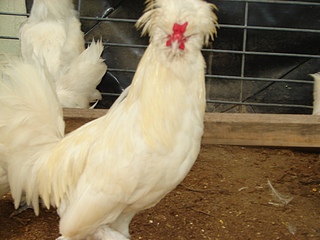Sultan Chickens: The Emperors Choice
Sultan Chickens are a smaller bird, but acts as if it knows that it was originated from Turkish royals.
Breed Facts:
Class: Standard: All Other Standard Breeds / Bantam: Feather Legged
Size: Standard Male: 6 Ibs. / Standard Female: 4 Ibs. / Bantam Male: 26 oz. / Bantam Female: 22 oz.
Comb, Wattles & Earlobes: They have a V-shaped comb and the wattles and earlobes are all very small and bright red.
Color: White
Black: The beak is black and the eyes are brown. Their shanks and toes are black. They have standard black plumage.
Blue: The beak is horn and the eyes are brown. Their shanks and toes are a bluish slate. They have standard blue plumage.

White: The beak is light horn and the eyes are reddish bay. The shanks and toes are bluish slate. They have standard
white plumage.
Place of Origin: Turkey
Conservation Status: Study
Special Qualities: They are known for their calmness and make good pet chickens.
This breed is called Serai-Tavuk in their native Turkey. They are a very old breed that was indeed kept by Turkish royalty for centuries as garden ornamental birds. They were first brought to England in 1854 and then made their way to the United States in 1867.
They are relatively small and combine a crest, a beard and muffs, and vulture hocks on their well feathered legs. They are calm and easy to handle and are well suited for confinement living.
They do not do well in free range situations. To keep them looking their best it is recommended to keep them in a good and dry coop. They lay small white eggs, but the hens are not the best layers and do not go broody.
Sultan Chickens were first admitted to the APA in 1874.

Custom Search



New! Comments
Have your say about what you just read! Leave me a comment in the box below.